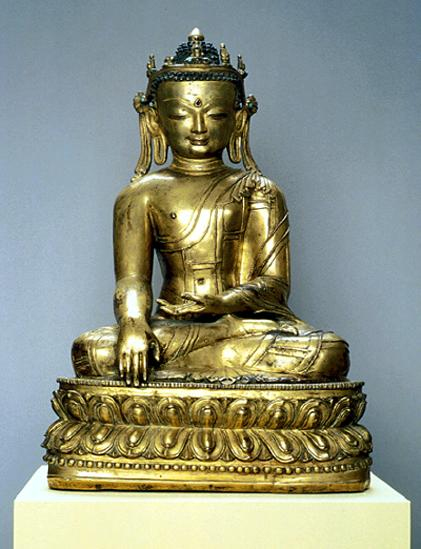
The Buddha
Two Prayers to
Precious Master Guru - Tibetan Chant
chanted by
Lama Surya Das and Steven Halpern
(from
Chants to Awaken the Buddhist Heart 2000)
"Buddhism begins with a man" (Smith 1994:60). When asked, the question is not "who are you?" but "what are you?"
"Are you a God?" and the Buddha's response, "No."
"Are you an Angle?" "No."
"Are you a Saint?" "No."
"Then what are you?"
and the Buddha's answer, "I am awake!"
Sanskrit root budhi means "to awake," "to know"
Born 563 B.C.E. Siddhartha ("pure rice") Gautama (his family name)
same time as Confucius in China, Cyrus in Persia (Eastern Europe to Indus Valley), Pythagoras in Greece
A Cinderella "fairy tale" in reverse! Prophecy at birth: child would either become great ruler and conquer, or an ascetic and "redeemer." So his father, the ruler, raised Siddhartha in royalty and caste privilege, an opulent life, in a relatively small kingdom. His father kept the outside world of despair and suffering from him his son.
But during his early years, Siddhartha experiences the "Four Passing Sights" - he sneaks out of palace and sees inequality and suffering of world:
decrepit old man
diseased person
death
and an ascetic monk
At age 29, Siddhartha has his "Great Going Forth" - he leaves the comforts and power of his royal life, including his wife and son, and goes forth . . .
learns from Hindu masters
becomes an ascetic and travels country for 6 years
embraces "The Middle Way" between extremes of acetic and indulgent ways of life - first principle of his teachings
At age 35, Siddhartha has "The Great Awakening"
At Bo Tree (Bodhi or "enlightenment") tempted by Kama Mara ("desire" and "death")
But so powerful, beyond words, Siddhartha at first
withheld his enlightenment.
How could others experience what he had
experienced? Most
people "wrapped in womb of sleep, dreaming as if awake." But
finally realizes that there are some ready, as a
lotus.
Returns
to teach for next 45 years
His name, Siddhartha,
was replaced with, the Buddha. The
Sanskrit root, budhi means "to awake," "to know"
Buddha decides to go forth and help others, model for Bodhisattva, and delivers his teachings, the Dharma (new definition from Hindu, not true role, but the teachings),
including Four Nobel Truths and Eightfold Path as the Middle Way
keep in mind, the teachings are not divine revelations and as we'll see, he is no Abraham, Moses, Jesus, Mohammad
the teachings are not based on set of beliefs or dogma, not about having "faith," no Nicene Creed
but based in practice, doing, being a practitioner, a way of life.
and in a final analysis, may not even describe it as a "religion"
Buddha is described as "cool head, warm heart," "silent sage," and a "rebel saint"
sought to make enlightenment accessible to masses and not just elites, challenging the caste system and render it equalitarian,
and focus on problems of the day, immediate, not down the road, not in next life - and how can be resolved
and that problem is suffering and that resolution is bringing compassion into all lives
Buddha is more like a physician, offer a diagnosis of your illness, and a cure for it suffering -
Four Noble Truths and Eight-fold Path
Why not remain in state of enlightenment? why return to world of suffering? (last temptation of Mara)
Buddha says few would be ready to hear, like the lotus flower, but "some will understand" - Bodhisattva
In 483 B.C.E., at age of 80, the "awakened one," ate a bad piece of meat, and the Buddha left this earth.
Just before his passing, told his followers not to grieve for him, everything is transitory - anicca - everything that is born must decay and die.
Emperor Ashaka (3rd century B.C.E.) makes Buddhism the state religion for most of subcontinent, mandated by power and force of the state.
But it is often acknowledged that its rapid spread is attributed to its powerful new narrative, its message (Buddha's description of human condition and its prescription for relief), and its ease of accessibility to all, and in fact the first "missionary religion," converting is easy - recite the Three Jewels:
I take refuge in the Buddha
I take refuge in the Dharma
I take refuge in the Sangha (and by the way, first religion to establish institutional monasticism)
The "missionary zeal" of Ashaka, didn't however continue with those who followed Ashaka. Buddhism does not send out missionaries today. And by 4th century C.E. Buddhism dwindled in India, but spread throughout the world.
Nevertheless, today 4th largest religion in world, with over 400 million adherents (Christian - 2.1 billion, Islam - 1.5 billion, Hinduism - 900 million)
China - 150 million, Japan - 90 million, Thailand - 56 million, Vietnam - 50 million, Myanmar (Burma) - 42 million, Cambodia - 9 million, Sri Lanka - 12 million, Taiwan - 9 million, India - 7 million, along with Himalayan countries of Tibet and Bhutan - in which 75% of the population are Buddhists.
In United States, some 3 million adherents, about 1% of US population, though over 25 million say they are influenced by Buddhism, (especially writings of the Dalai Lama, exiled from Tibet, Nobel Peace Prize winner), some 12% of American population.